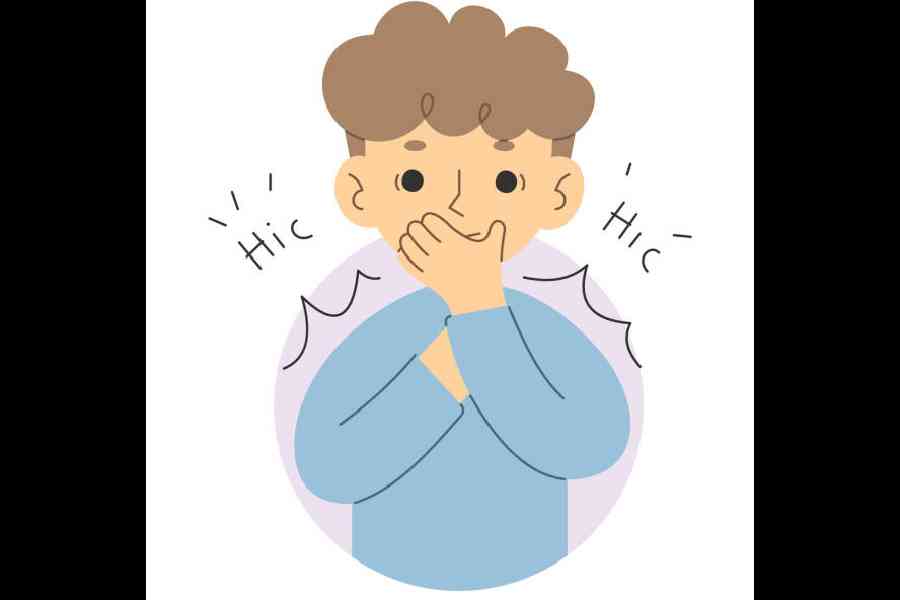We all develop hiccups — medical term singultus — occasionally, some more often than others. Babies can be seen (in ultrasounds) hiccupping in the uterus. After birth, many continue to hiccup frequently. In adults, a few hiccups are funny. After that, they become distressing to both the sufferer and bystanders.
What exactly are hiccups?
They are caused by the forceful, uncoordinated expulsion of air due to the contraction of the diaphragm. The action of the diaphragm is coordinated by the vagus and the phrenic nerve. Irritation of either of these produces hiccups.
Babies hiccup often. This may be due to swallowing milk too fast or ingestion of air with the milk. The stomach expands rapidly and presses up against the diaphragm, irritating it.
Hiccups can be tackled in babies by altering the feeding position; just raise the baby’s head a little more. All feeds should be followed by proper burping. After the baby has fed on one breast, keep the baby upright over the left chest and shoulder and tap rhythmically until the ingested air is expelled in one or two burps. Only then should the baby be fed on the other breast.
In adults, hiccups last only a minute or two. They can be precipitated by eating fast, swallowing air, drinking carbonated beverages, chewing gum or sucking on candy, alcohol consumption, smoking, vaping, stress, nervousness and sudden temperature changes. General anaesthesia can cause hiccups. Some medications like the antibiotic azithromycin, steroids, some sleeping tablets, anti-Parkinson’s medication and chemotherapy can also cause hiccups.
The most common type of hiccup is temporary or transient. It lasts only a few seconds or minutes and disappears on its own. Recurrent hiccups may last more than a few minutes. They tend to reappear with the same stimulus, like low temperatures or spicy food.
Hiccups that last longer than 48 hours are called persistent hiccups. They have to be taken seriously as they may be caused by infections like meningitis or encephalitis irritating the brain and nerves or metabolic diseases like diabetes or kidney failure. Rarely, they may be caused by a tumour on the underside of the diaphragm. They may interfere with eating, sleeping and even breathing.
Several home remedies for hiccups exist. They are not proven scientifically, and most people have their pet theories about how to cure hiccups. Here are some you can try.
n Cover your nose and mouth with a paper bag and breathe into it for a few minutes
n Drink cold water or gargle with ice water
n Sit down in a comfortable place. Bring your knees to your chest and lean forward. This compresses the chest and puts pressure on the diaphragm
n Try to exhale while simultaneously pinching nose and keeping mouth closed.
n Try to swallow while holding your breath
n Bite into a lemon
There are also acupressure points for hiccups that you can try.
l Apply pressure to a point behind the earlobe for 3–5 minutes, along with deep breathing. It is 92.6 per cent effective in treating chronic hiccups
l Find the small dip behind the jawbone and just below the earlobe. Press forward towards the jawbone with your finger for 1–2 minutes while taking deep breaths
l Put your finger in the dip between your nose and upper lip, then gently press for 20–30 seconds while breathing deeply.
Transient hiccups rarely cause a problem. Persistent hiccups can cause discomfort, difficulty eating, weight loss, acid reflux, low carbon dioxide levels in the blood, loss of sleep and depression. Violent hiccups can cause a Mallory-Weiss tear, a bleeding rupture of the lower oesophagus.
Intractable persistent hiccups can also be treated with medication like baclofen, chlorpromazine or metoclopramide. Rarely, surgical resection of the nerves to the diaphragm is required.
The writer has a family practice at Vellore and is the author of Staying Healthy in Modern India. If you have any questions on health issues please write to yourhealthgm@yahoo.co.in











